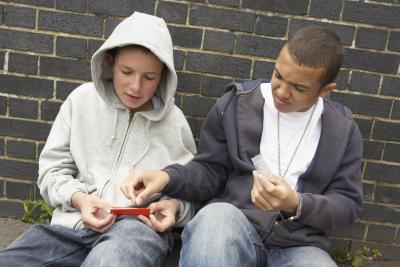Seeing your child dabble with drugs is often painful and worrisome. When a child falls into the habit of using controlled substances, this behavior can quickly escalate into addiction, making it even more challenging for parents to help their kids kick the habit. If you believe that your child may be dealing with this very adult life challenge, there are some things you can do to help him get back on the right — and drug-free — path.
Signs
Determining whether or not your child is under the influence of drugs is the first step to getting her the treatment she requires. In most cases, teens and kids will hide their drug use from their parents, making it difficult for you to immediately detect their addition. If you think that your child may be under the influence of drugs, watch for some of the common signs associated with drug addiction, including loss of interest in activities she used to enjoy, anxiety or anger, mood swings, change in sleeping habits, change in eating habits or change in group of friends, according to KidsHealth.
Intervention Avoidance
It can be hard to allow yourself to believe that your child is a drug addict; however, it is important not to avoid the issue. As DrugFree.org reports, lying to yourself about your child’s drug use is not only counterproductive, it could also lead to your child having more trouble kicking his habit. By intervening as soon as you begin to suspect a problem, you can likely prevent your child from slipping further into addiction; the deeper your child has moved into addiction the harder it will be to help him overcome it.
Set Limits
As a parent, it is your responsibility to set limits for your child. If your child has become a drug user, it is likely time to tighten these limits, according to DrugFree.org. Don’t assume that it is too late to be more strict with your child. Instead, explain to her that you are going to be more firm in your limitations because of her behavior, allowing her to see that the change isn’t random, and tighten your rules. As you do this, attach clear consequences to these rules so that your child knows what will happen should he violate them.
Dry Run
Don’t go into approaching your child about his drug use unprepared. Instead, practice your approach. Sitting down with your spouse or another trusted friend or family member and running through the conversation, each of you playing a role, can help tremendously, reports DrugFree.org. By doing this, you can more carefully select your words and perhaps make the task of speaking to your drug-addicted child about his problems a bit less overwhelming.
Recognize Withdrawal
If your child is truly addicted to drugs, she will likely feel symptoms of withdrawal if and when she tries to give up the habit. As KidsHealth reports, withdrawal symptoms can include diarrhea, shaking and general feelings of sickness. Help your child as she moves through them. This support could mean the difference between success and failure.
Resources
You do not have to wage your battle against drug abuse alone. As Gatehouse Academy, a drug and alcohol abuse recovery program, reports, there are numerous resources at your disposal. Nar-Anon is a program specifically for drug abusers that follows the same 12-step program as many alcohol support groups. If you are able to locate a chapter of this support group in your area, attend it with your teen, or provide your teen the means to attend it alone. Also consider family therapy or individual therapy, which can help your child work through his issues more effectively. To find a family or individual therapist who specializes in drug abuse, speak to your child’s doctor.





